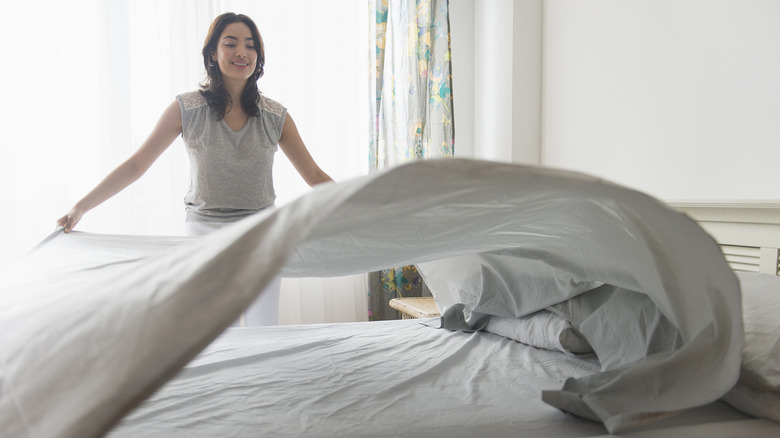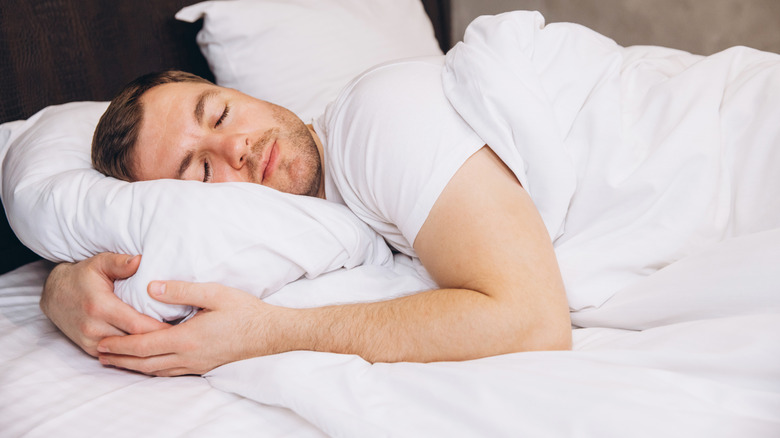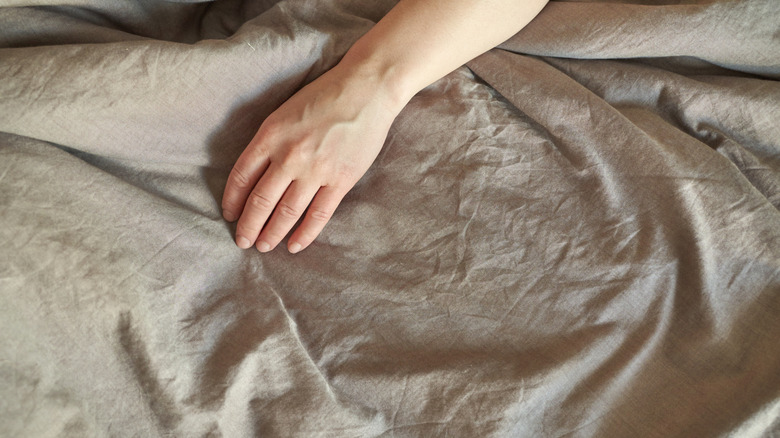Bedroom Grounding Sheets Are All Over TikTok, But Are They Safe?
TikTok is full of cleaning hacks, health fads, and pseudoscience tricks that users love to try out. While some of these are well-supported, helpful tips, you're also bound to run into a few viral trends that aren't worth the hype. Lately, grounding sheets have been going viral on TikTok, and if you're not sure what they are, you're not the only one. They work by connecting to electrical outlets in your home to help electrons flow directly from the ground into your body. Supposedly, these sheets can help you get a better sleep and can even relieve your chronic pain.
If you're hoping to try out these miraculous health benefits for yourself, you might be wondering about the science and safety behind grounding sheets. Put simply, grounding sheets can be dangerous if you connect them to a faulty outlet or use them during a thunderstorm. And as of now, there is little scientific evidence backing up their proposed benefits.
Staying safe with grounding sheets
Given the fact that you have to plug grounding sheets into an electrical outlet, you might be wondering how they're safe to use while you sleep. After all, most other products that rely on electricity, like electric blankets, are generally flammable. However, grounding blankets don't actually use electricity at all. You only plug them in to form a "connection" between your sheets and the ground, allowing electrons to travel through fibers (usually made of silver) that are woven throughout the product. This means that the blanket won't get hot, and most grounding sheets don't seem to have many flammability issues at all.
However, because these sheets need to be plugged in to work, there is a significant risk of being electrocuted during a thunderstorm. Many grounding sheet manufacturers require you to unplug the product during these weather events because there is potential for a surge to occur. This would cause a harmful and potentially deadly electric shock to you and anyone else using the sheet. The even bigger issue here is the fact that you could be asleep while a thunderstorm happens, so you might not even be able to unplug your grounding sheet in time.
Additionally, many manufacturers advise having a professional double-check any outlets you plan to use with your grounding sheet. If your home has wiring problems, then your sheet could shock you — even if it doesn't do so right when you plug it in for the first time. If you're absolutely set on using this product, you must keep these safety tips in mind.
Thet might not do anything at all
One major problem with grounding sheets is that there is little legitimate scientific evidence to back up their benefits. Sleep study publications and doctors alike have pointed out the fact that many current studies on their efficacy have not been published in verified scientific journals. This means that the research has not been peer-reviewed for accuracy. Additionally, studies on grounding sheets often come directly from companies and manufacturers that sell them which gives them an inherent bias. There are some studies in legitimate scientific journals, but they typically have small sample sizes and use self-reporting for measuring efficacy, making it difficult to make any serious conclusions about purported benefits. It's also possible that the placebo effect influenced some results.
Reputable scientific evidence says nothing to support the idea that grounding sheets will do anything for you. While they don't seem to pose a significant safety risk at the moment outside of potential power surges and faulty electrical connections, that doesn't mean that they're worth getting. The unsupported claims from companies that sell grounding sheets also pose another disturbing question: Could these companies be cutting corners when it comes to uncovering potential safety risks from these sheets? While it seems unlikely that grounding sheets will actually pose any negative side effects to your health, it might still be best to save your money and prevent any potential outlet issues in the future by avoiding them entirely. If you do decide to try them, be sure to take a look at what you need to know first.


